Fatal Attraction, James 1:13-15
Discussion & Practice
- Read James 1:13-15. What are some wrong assumptions you've made about what God is actually doing in the midst of the trials of life?
- What truth does this passage teach about God's relationship to evil and temptation and how does that affect your view of him?
- In what ways have you seen sin in your life start small, continue to grow, and give birth to more sin and destruction? What about in the lives of those around you?
- Why is sin compared to adultery in this passage? In what ways does it affect your intimacy with God?
Practice: Read James 4:1-8 and practice the humility that it takes to name your sin. If your group is comfortable enough, name the sins that entangle you and confess them. James 5:18 tells us to confess our sins to each other and pray for each other that we may be healed. If you are unable to be vulnerable in the larger setting of your Life Group, grab one or two people this week and confess to each other. See what happens when you expose the darkness to the light. Then pray for each other.
Notes
James is teaching us about genuine faith and helping us understand what fake faith is. He’s taking us behind the scenes and showing us how genuine faith works.

Testing and trials and endurance is the theme. He’s helped us understand how faith works and what the economy of faith is.
If you want to see what these verses do together, here’s a picture of the bookends.

We’re getting to see in the paragraph how faith really works. We think of salvation and eternal life at the end, but James is saying there’s a whole process of maturity that’s occurring here and now.
Dallas Willard made the point that the arrangement God has made to redeem us from sin would lead to a life of not sinning. You’re not just getting redemption or salvation so that you can go to heaven, but being transformed into someone who has this kind of life.
I’m transformed, and then begin having this life imparted to me.
As my character grows, God’s character is being imparted to me now. I’m not waiting for that life until I get to heaven.
There’s a transformation of your life, not just a destination.
John Henry Cardinal Newman has a book of discourses published in the middle of the 20th century. I read a couple of his sermons this week. One of them is about holiness for future blessedness. He says, Heaven is not for everyone. It’s a required taste while our taste buds still resemble a crocodiles back. An unholy person would be uncomfortable and restless in heaven. To enjoy God forever is to cultivate a taste for this project, to become more and more the sort of person for whom eternal life with God would be sheer heaven.
One of the tests James has given us had to do with economy of life above the economy of the world. Certainly having or not having the resources we need is a test. We question his providence and his character. Can I trust in his goodness when I’m hurting or when I lack?
All tests call for some quality of character. They usually produce some kind of moral character for you. And the test becomes a temptation. And the temptation is to do things your way instead of God’s.
James uses the words, ask, receive, and blessed. We’re supposed to ask from God, receive from him, and be blessed by him. God’s resources are available to us. We ask, we receive, and we become what he wants us to be. That’s the process as James has laid it out.

We’re going to learn about sin and suffering in this text. They’re related in some ways.
I think it’s a better thing to use the word test for the first tempted in verse 13. They’re the same word, but he’s switching topics.
Suffering and sin are closely related. James wants us to understand God behind our trials, but in a nuanced way.
God is involved in trials in a different way than he is involved in your temptations. There are two reasons why God has a different relationship to testing and temptation.
God cannot be tempted to evil and he tempts no one. It’s inconceivable theologically and practically.
James uses a word “untemptable,” coming up with a word to try and describe God. In his very nature, evil is foreign to him. It’s not an option for him.
One commentator said God is not susceptible to any desire or impulse to sin. So he cannot be seen as desiring it for anyone.
Because it doesn’t operate like that in him, he does not tempt anyone. He doesn’t put that on you.
James has already told us that God is single-minded. All he wants for you is to grow. He wants good things for you. James is saying we shouldn’t be double-minded, because God is not double-minded. His purposes are pure for us. It’s important to know that sin and evil are not bigger than God. He’s not surprised by it. He’s sovereign over it and uses it. It never thwarts his plans or purposes. And he redeems it. That may be his best character quality. He doesn’t run from evil, he steps into it and transforms it.
1 John 1:5 says that God is light and in him is no darkness at all. There’s no dark side to God’s thinking or his ways. One writers says he outlaws it, he forgives it, he redeems it, and he suffers to do so.
God knows what to do with it, but he does not alter it. He doesn’t create it, nurture it, or sponsor it in you.
While God is creating something great in your life, there is something sinister trying to do something else.
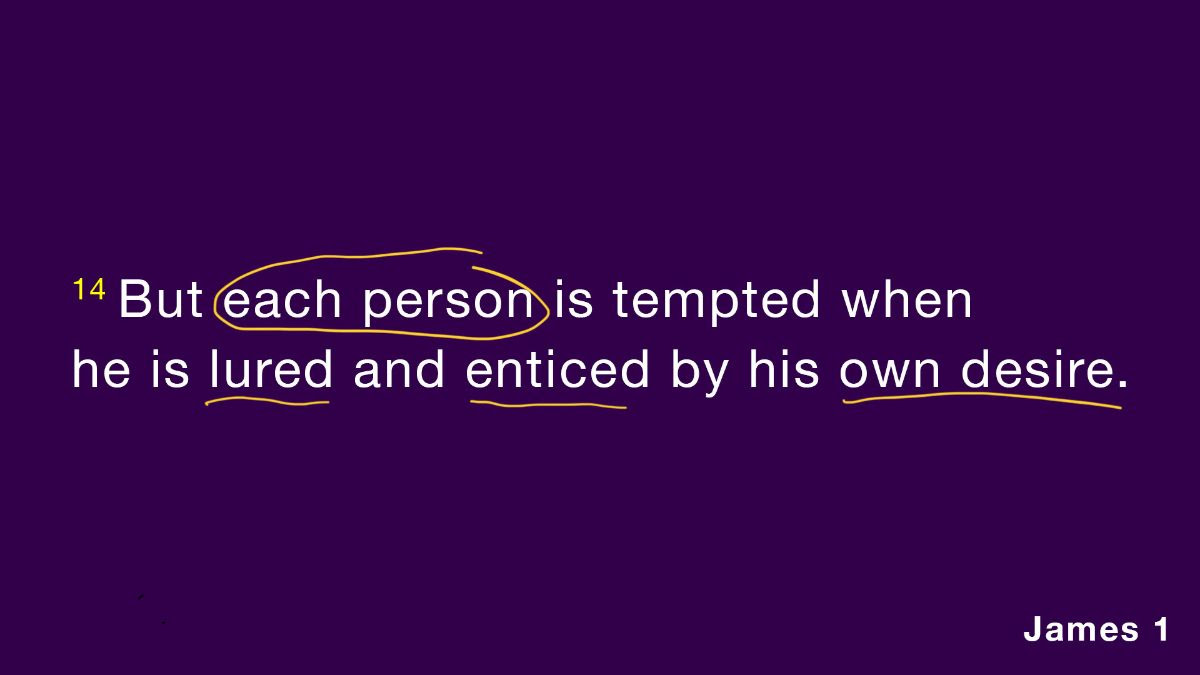
We have a fishing illustration here. We get hooked and dragged into it. It’s a pretty graphic image for how sin works.
This desire is a perversion inside each of us. We pervert good things. It’s the word used for lust, but it can used for any kind of longing that goes too far. When you turn something good into something bad because you want it too much. We don’t always know what our hearts are going to get attracted to, and it hooks us.
When we think of “lust” we think of a sexual image. James is about to take us down that road.
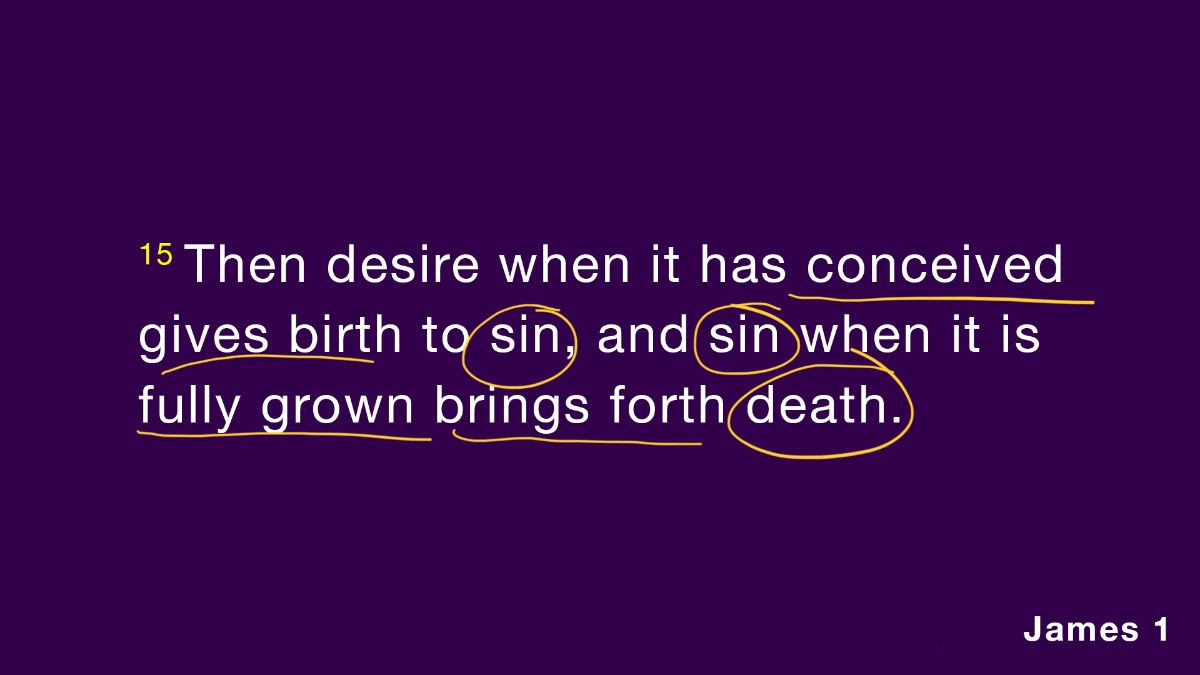
James has shown us how trials work and how temptations work. When God tests, it’s for endurance, maturity, and life. Temptation has another process that leads to sin and death. It’s another project going on in your universe. One commentator called it a sinister replica of what God is trying to do in your life.
This is the birds and the bees of sin. You get the elicit affair in it.
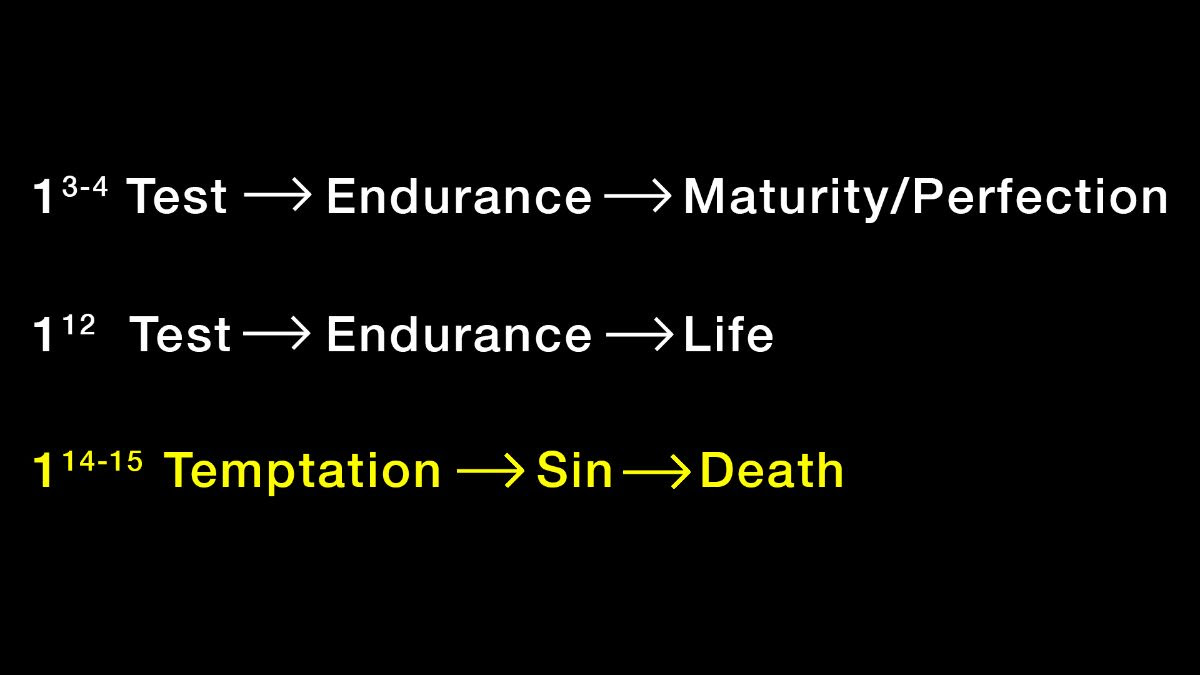
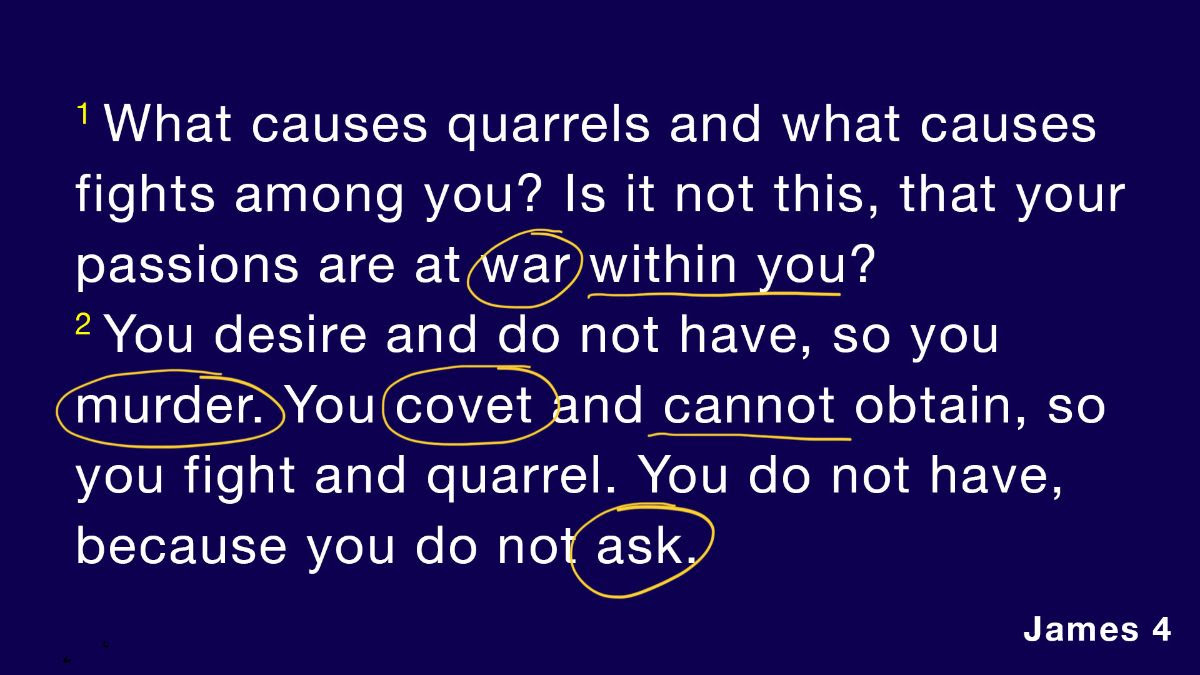
We have what God wants in us, but we have other desires at war within us.
Desires are forcing you down a path to get what you want. Or you could ask God for what you need.
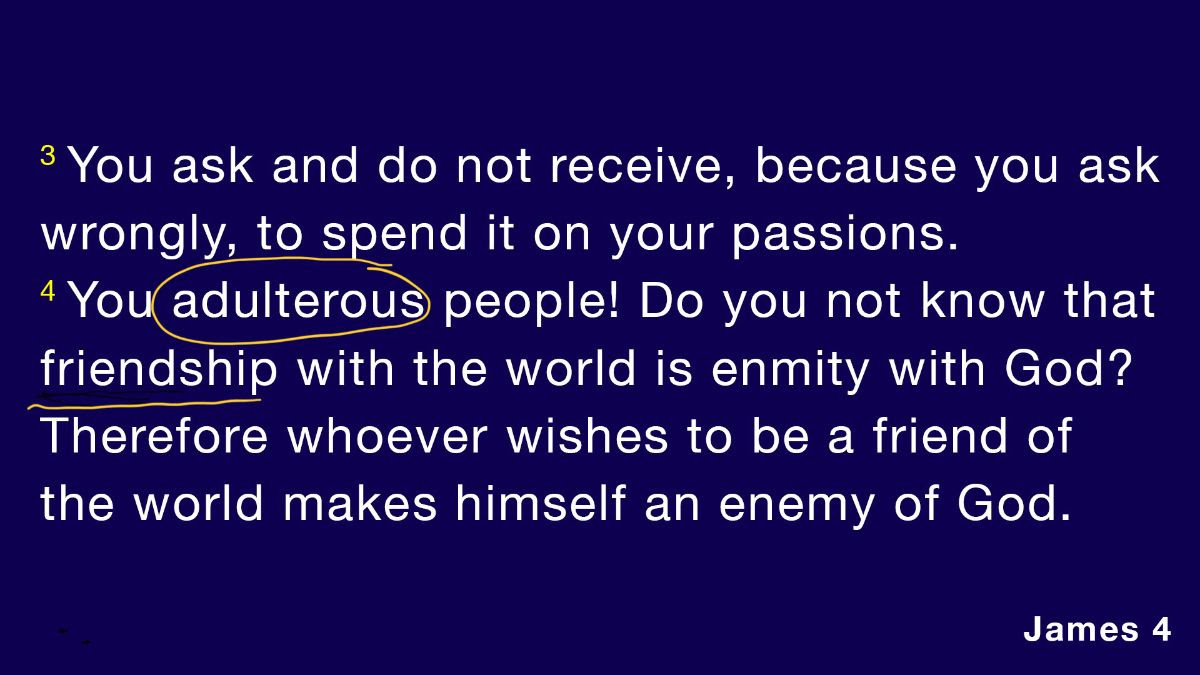
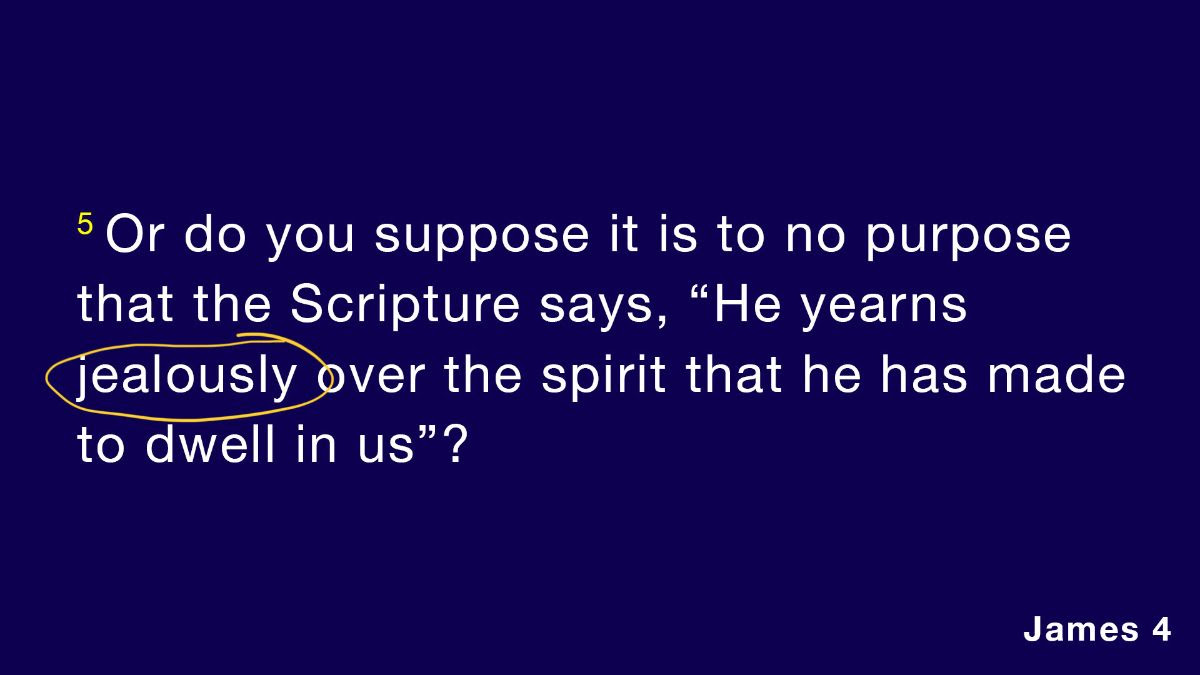
It’s a sensual image. When we don’t do what God wants us to do it’s like infidelity. It’s a graphic image.
Sin is a betrayal of lovers. You sleep with it. You’re in bed with it. It’s a violation of intimacy. It’s a fatal attraction, because it leads to death. It’s both fertile and fatal.
One of the commentators made an interesting connection to Genesis 1-5, which talks about sin reproducing itself. That’s what James is talking about. When God in Genesis 1 tells us to be fruitful and multiply, this was his vision and purpose for us. We were meant to reproduce God’s image in the world.
We get to Cain and Abel. Genesis is about these two lines. The line of Cain is the evil line, and the line of Abel is the faithful. Jesus comes from the line of Abel. Cain is trying to kill that line. Cain kills him. That’s what this line does is kill. So they have to give birth to another son, Seth, and he takes over the line. The seventh person gets highlighted in both of them. In Cain’s line, it’s Lamech, and in Seth’s it’s Enoch.
Lamech has two wives and kills people. Enoch doesn’t even die, but gets taken up into heaven.
Sin is my way of doing things and is a beeline to death.
What James is saying is that sin is a fruitful and multiplying process in your life that is destroying everything God wants to accomplish in you.
Cornelius Plantinga says sin kills because it reproduces. Like cancer, it kills because it reproduces. It becomes more than we can manage. Some of us now probably have things in our lives that we think we can handle. We think we can keep it going or that we have it under control. You become desensitized to sin and its whole reproduction process. When Gail and I got married, we talked about having four kids. By the fourth one, we were in denial. It was growing and eventually gave birth.
What James is trying to say is don’t live like that with sin in your life. It will take on a life of its own and have its own biography. When we sin, we create a life of our own and don’t know what it’s producing and reproducing. James is saying you’re going to end up with this baby of sin that grows and the sin gives birth to sin and you become a grandparent of death.
It’s just so horrifically in opposition to everything good.
James is saying you need to know where sin babies come from deep inside your heart. Lust feels like love sometimes. It can grab a hold of your heart and you think you’re in love and what you don’t realize is that you love death.
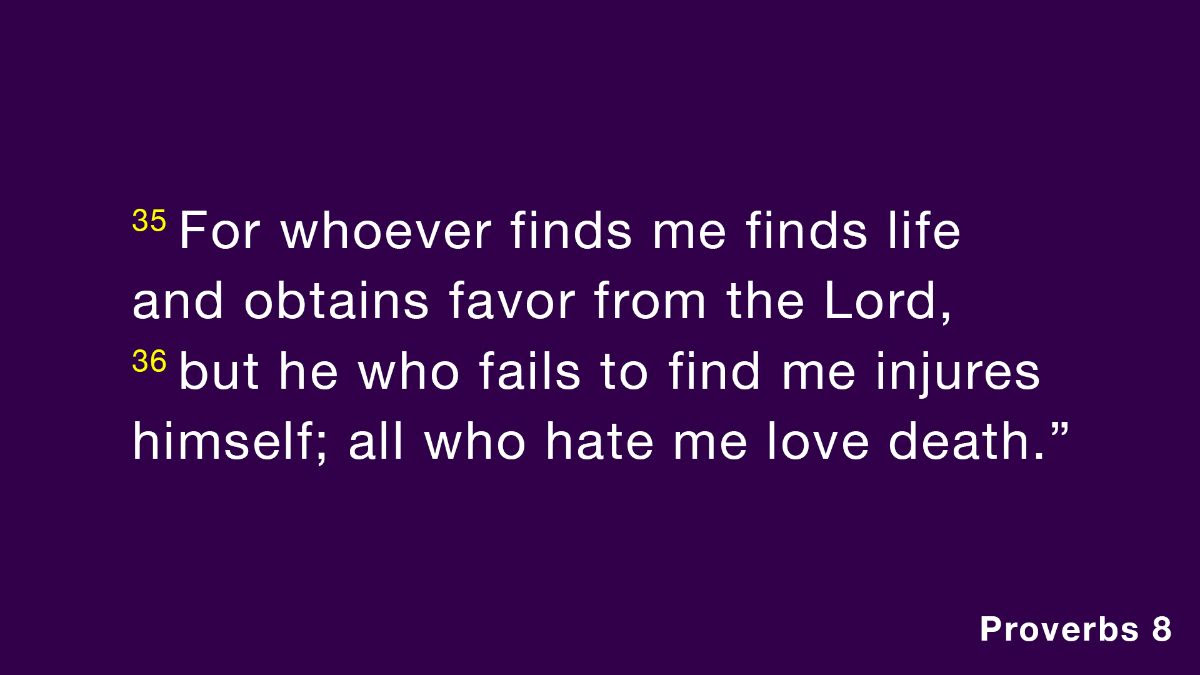
Any sin I coddle means I love death. When James says “fully grown” about sin, it’s the same word for perfect. It’s the same word God is working in my life. There’s a “perfecting” process at work either way.
If you’re double-minded, you’re trying to produce one thing while coddling this sin baby.
Plantinga writes, It’s horrific not merely because it shows disloyalty and ingratitude for what God has done, but because the perpetrator becomes the victim.
You don’t even know that you’ve signed your own death warrant. Divided worship destroyed worshippers. Divided love destroys lovers. You’re becoming an enemy of your best friend, God. Your divided love destroys the love relationship. To split the longings and loyalties is to crack the foundations and invite the crumbling. A divided house can’t stand.
Do you know when you sin? Do you know what that sin is doing to you?
James’ picture is much more graphic than we tend to think. He’s asking if you know what your sin baby is and if you’ve named it. Until James names it covetousness and adultery, I don’t know how bad it really is.
James makes you name the baby. You might be nursing one, like a bitter spirit. Feeding a greedy heart. You just cannot get enough and you keep filling it. Self-indulgence. Or you’ve given lust way too much freedom. What seemed like an innocent dabbling has become a little more sinister and you can’t let it go. Or anger. You’re snapping at people and everything makes you mad. Do you even hear yourself anymore when you gossip? Do you even know what it is? Can you tell the difference between having a conversation and it being gossip or not?
Do you know the difference in your language? Or arrogance and you think you’re better. It could be alcohol. It destroys people’s lives every day and you don’t even know it. Same with porn. You don’t even know the damage it’s doing inside you. It does not feel like it’s killing you.
Even now, you might not be considering a godly option to a dilemma in your life. Should we live together? Is it even an option not to? Should we buy this or have that?
And if someone even suggested you ought to be a little more humble, you’d say no way.
James says in chapter 4 that he who knows what is right to do and doesn’t do it, to him it is sin. Maybe you do see the right thing and blatantly refusing to do the right thing. Or you hide behind holiness while you have your own secret sins that you justify. In one of the articles about secret sins, the writer says integrity on one side doesn’t make up for evil on the other side.
The one rule in our house was never put your shoes on the table. We’d get backhanded for it. Meanwhile, my dad was adulterous and abusive. Somehow he felt better that he had one thing he didn’t do and could hold other people accountable for.
We’ve gotten a little bit comfortable with a divided heart. We don’t fear what sin does, we don’t hate what it is, and we don’t grieve its presence in our lives.
If you don’t know how great your sin is, you can never truly be amazed by grace.
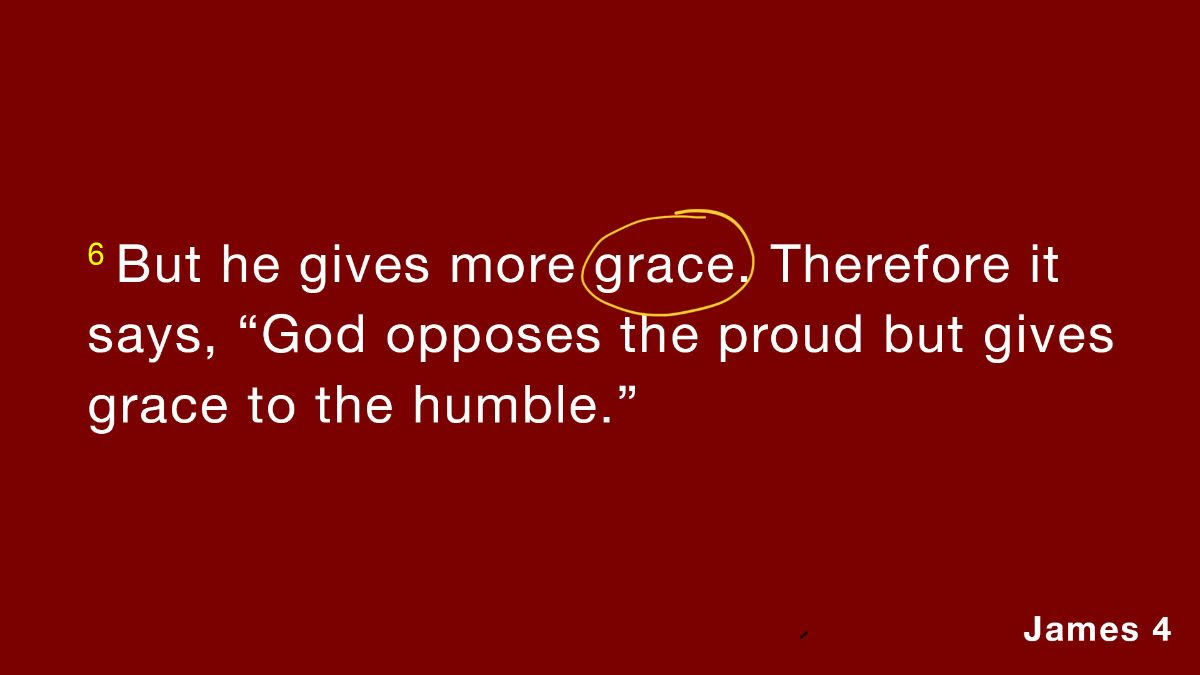
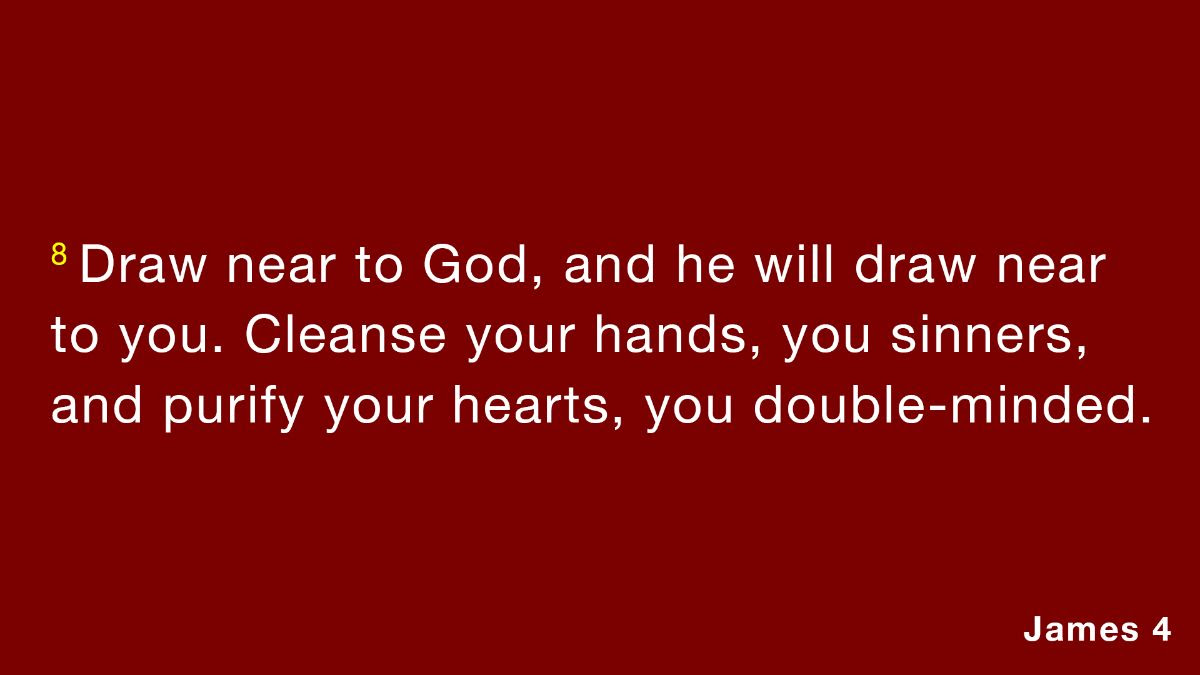
Tell God, name your sin in your life that will no longer be tolerated.
From This Series
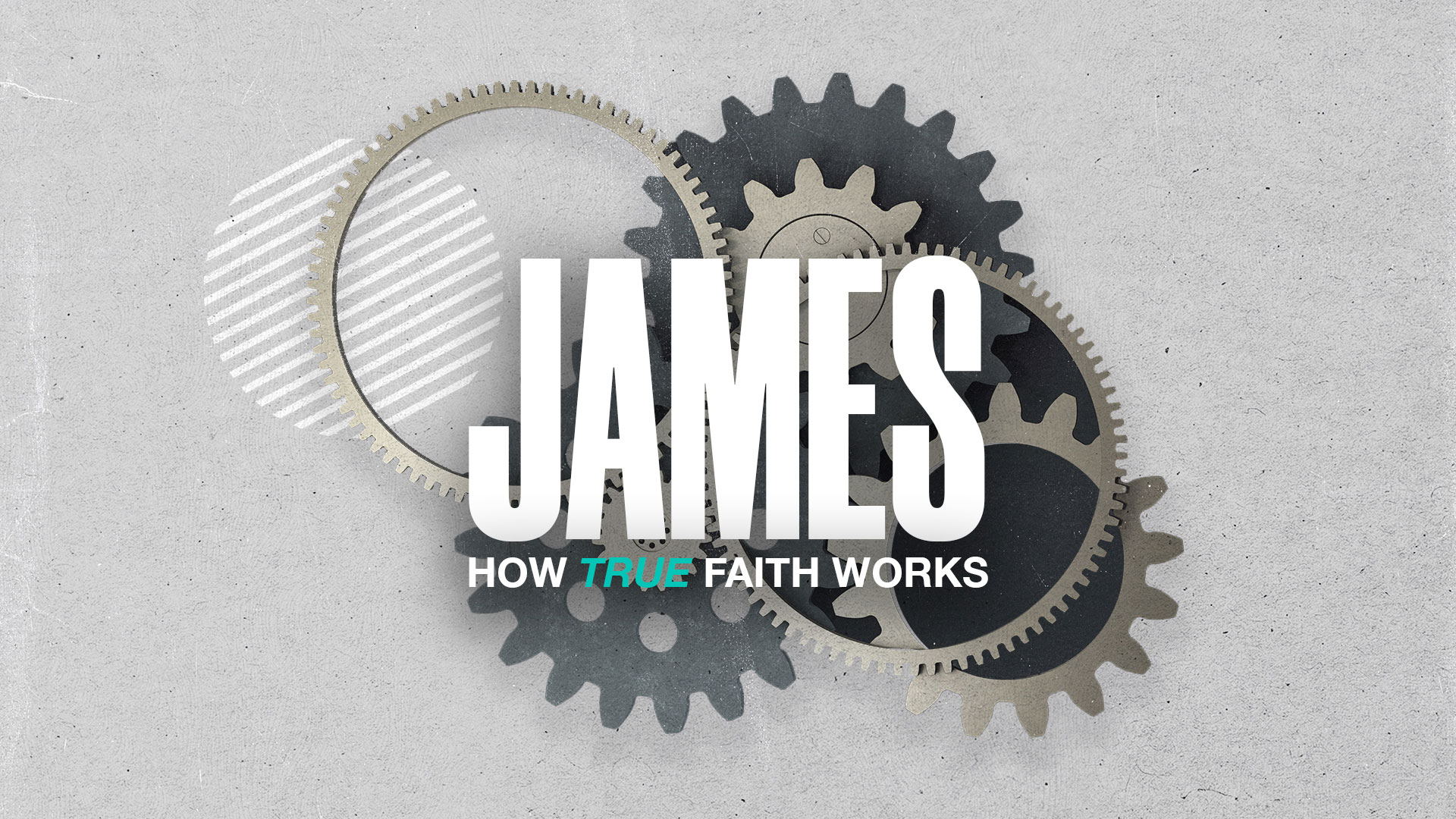
The Way Back, James 5:19-20

Make it Rain, James 5:13-18

Sin and Sickness, James 5:13-15

Straight Talk, James 5:12

Is It Possible...? James 5:11

X, Y, and Maybe Z? James 5:7-11

A Grumbling Grumble, James 5:9

Fix Your Heart, James 5:7-11

Suffering: A Framework, James 5:7-11

